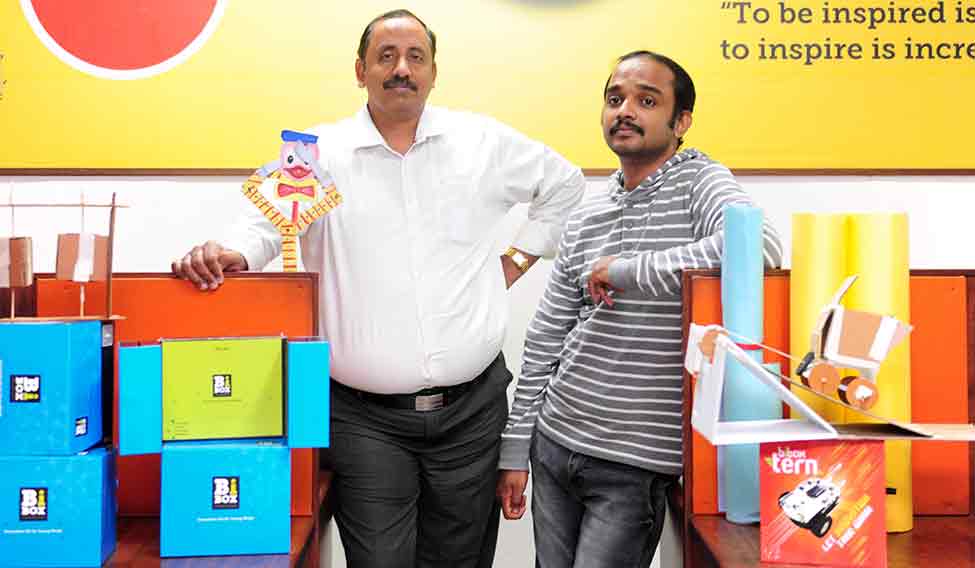Seema Jerath, principal of DLF Public School in Ghaziabad, was delighted to find that some of her class 6 students had designed an electronic version of ‘class pass’. A student has to take a class pass whenever he or she has to step out of class, say, for going to the toilet. It was found that a few naughty students used to hide the passes after obtaining them.
Now, with the electronic version, the class pass is activated only if a student inserts his ID card in the slot. The pass also has a timer that notes the exact time a student takes it. There are two class passes and only two students at a time are allowed to go out for a break.
The electronic class pass was designed with the help of BiBox, a programmable innovation kit created by the Bengaluru-based startup Evobi Automations. “Ours is a very child-centric school and we give emphasis to meaningful learning. BiBox adds value to our teaching methods. The company has been constantly innovating and reinventing itself,” says Jerath. “It actually makes children think and invent things based on their needs and requirements. Currently, 400 students from our school are pursuing the BiBox programme.”
BiBox was codeveloped by Sandeep Senan, who says it is a first-of-its-kind platform in India that helps students build gadgets. Growing up in the small town of Bhadravati in Karnataka, Sandeep had a passion for dismantling toys and electronic items, and then reassembling them into something totally different. He preferred spending hours in a neighbourhood electrical shop to attending routine theory sessions in classrooms.
During his engineering days, Sandeep worked on 18 projects and published and presented papers, besides guiding MTech students on various assignments. He even sold one of his ideas to the Defence Research and Development Organisation for Rs 12 lakh, and saved the money for funding future ventures. Once, Sandeep had the opportunity to teach children how to build real-world devices. That was when he realised that he had to do something to foster scientific temper among the younger generation. It led to the creation of BiBox, with Madhusudan Namboodiri as cofounder.
The department of science and technology so appreciated the work that it came forward to partially fund the setting up of Evobi Automations. Since its inception three years ago, says Sandeep, the company has trained around 25,000 students in experiential learning of science, arts, engineering and technology.
“With our product, students have created a massaging chair, an automated Ganesha, rain-sensing wipers, an eyewear that prevents a driver from high-beam lights, etc,” says Namboodiri. “There was also an interesting project where students at Shishya School in Hosur in Tamil Nadu altered the ignition system of a car in such a way that it wouldn’t start unless the driver fastened the seatbelt. The contact sensors detect the fastened seatbelt, and when that happens, the programmed micro-controller turns on the ignition relay.”
Experifun, another Bengaluru-based startup, aims at nurturing the scientist in a student. Its curriculum-based products allow children to explore scientific concepts and learn how they work in real time and with real objects. “Asking questions and working towards finding the answers are two main aspects of learning science,” says Rakesh Kumar, cofounder and CEO of Experifun. “Newton asked why the apple fell down and worked towards finding the answer. Our aim is to inculcate this culture among children to help shape their scientific thinking.”
Kumar, who holds an engineering degree from IIT Varanasi and an MBA from IIM Ahmedabad, says his company has tied up with 15 schools across India. “We are also in talks with some of the leading organisations in the US and the UK,” he says.
At Experifun, a lot of effort goes into the development of learning gadgets. While the academic research team works on the ideation, the electronic circuits and other aspects, the design team focuses on the products’ usability and effectiveness. “Overall, we have to spend four to five months to develop one gadget,” says Kumar.
Another startup that is changing the way students learn is Avurtana Learning in Bengaluru. Its flagship brand is HobbyMaster, an experiential learning programme based on hobbies. The company also provides learning aids in aero-modelling, electronics and robotics. For instance, with the help of the kit provided under the company’s ‘fun electronics’ segment, students can design and build headphones.
The founders of Avurtana Learning, Rajiv Koyal and Guruprasad Athani, met because of their mutual interests. “Rajiv’s hobby is aero-modelling and I used to take my daughter for aero-modelling camps. It so happened that I met Rajiv, who used to conduct aero-modelling classes. We decided that we should work together,” says Athani, an electronics engineering graduate who worked for more than 20 years for organisations such as Bharat Electronics Ltd and Infosys.
He says he always wanted to be associated with learning aids. After quitting Infosys, he worked in government schools in Karnataka’s Chitradurga district, designing learning aids for children. “Rajiv’s strength was in building mechanical designs and aero-models and I wanted to design learning aids. He was running a small company, HobbyMaster, and together, we founded Avurtana Learning Ltd in 2014,” says Athani.
The company builds aero-modelling kits using balsa, a light variety of wood imported from Indonesia. It has tied up with several schools in Karnataka and Kerala and are in talks with schools in Maharashtra to spread their concept of experiential learning. “It takes a lot of effort and ability to take the content and convert it into prototypes,” says Athani. “In our R&D team, there are engineers who try to think differently and keep coming up with new models and learning aids to help schoolchildren.”







